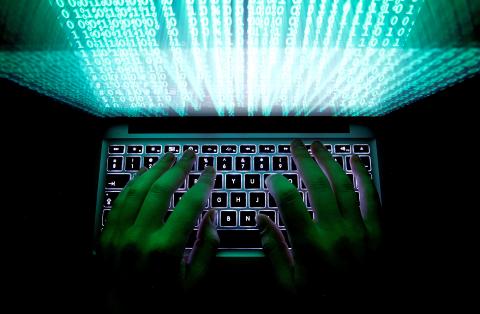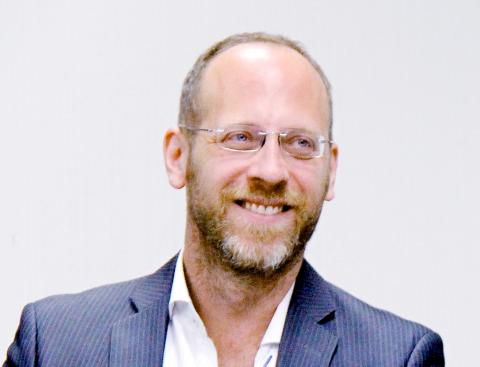In the thick of campaign season for next month’s high-stakes presidential and legislative elections, Reporters Without Borders (RSF) will hold its first conference in Taiwan tomorrow on the theme of “Disinformation: Time for Solutions.”
“As the elections are approaching, the risk of disinformation attacks is getting bigger and bigger,” Cedric Alviani, RSF East Asia bureau head, told the Taipei Times. It’s a risk that “will remain until Taiwan properly addresses the problem of its media environment.”
It’s a media environment “plagued by sensationalism, undeclared advertising and an unhealthy ‘blue-green’ political polarization that hinders journalism in its role as a balancing power, stirring public distrust,” Alviani wrote in an open letter from the RSF published in the Taipei Times last week.

Photo: Reuters
“It is not that Taiwan lacks competent journalists, but most of them have to work under undue pressure and cannot count on legal protection against requests from their management that would go against journalistic ethics,” Alviani wrote.
While good journalistic practice has conventionally meant avoiding becoming part of the news story, in the war against disinformation, journalists find themselves fighting in the trenches, and an integral part of the story themselves.
In Taiwan, that story is combined with front-line exposure to China’s economic rise and growing assertiveness in geopolitics, making it one of the most compelling vectors for tackling disinformation in the 21st century.

Photo courtesy of Reporters Without Borders
INFORMATION WARFARE
The threat of disinformation is neither new nor unique to Taiwan. Countries around the world have developed heightened awareness and defences since the allegations of Russian interference in the 2016 US presidential election, but propaganda has been around for much of human history.
Now, however, there is “renewed interest in learning about and from Taiwan’s own experiences,” J. Michael Cole, a policy analyst and editor-in-chief of Taiwan Sentinel told the Taipei Times. This is part of a “global awakening to the realities of contact with Beijing.”

Photo courtesy of Reporters Without Borders
“Taiwan obviously is a special case because of Beijing’s ambitions to annex it,” Cole, a former Taipei Times deputy news editor, added. “It’s one of the very few societies that shares a language and to a certain extent a culture with China, so that creates many more avenues” by which China can exert influence.
Cole, who will deliver a keynote speech on Chinese disinformation in Taiwan, pointed out that one area in which Beijing has proven adept is that of “gray-zone” tactics that may not be illegal under existing laws, but are arguably unethical.
That includes exercising control through media owners with strong commercial interests in China, a prominent example of which was seen in the Financial Times’ reporting that local media outlets The China Times and CtiTV (中天電視) — owned by Taiwanese food conglomerate Want Want China Times Group — took orders from Beijing.
Such tactics have made it even trickier for the government to balance protecting freedom of expression and clamping down effectively on disinformation.
“If Taiwan were not a democracy, it would be quite easy for the government to come up with the solutions,” Cole said. “The last thing that you want to do is go down a road where you start curtailing freedom of expression. By doing so... Beijing wins, because it gets what it wants.”
Echoing the challenge that lies before the government, Alviani, who will deliver a keynote speech on media certification, said that Taiwan’s problematic media environment is “not something that the government itself can change… but we believe some kind of impulse must come from the authorities.”
At the same time, leaving it entirely up to the government to decide what is legitimate and fake news is also an undesirable outcome that potentially hinders journalists’ ability to hold power accountable.
One remaining option is a form of self-regulation emanating from the journalism profession itself, such as the Journalism Trust Initiative by the RSF, which is developing a set of indicators for the trustworthiness of journalism, and seeks to promote and reward compliance with journalistic ethics.
“Taiwan needs to re-establish trust from the people to the media, because the problem so far is that most people in Taiwan do not [differentiate] between a legitimate news Web site and a Web site that would purposely carry misinformation,” Alviani said.
Combining the unique challenges of Chinese designs on Taiwan, as well as Taiwan’s own commitment to democracy and freedom of expression, tomorrow’s conference will be an opportunity to hear insights and solutions from within the journalism profession itself.

Every now and then, it’s nice to just point somewhere on a map and head out with no plan. In Taiwan, where convenience reigns, food options are plentiful and people are generally friendly and helpful, this type of trip is that much easier to pull off. One day last November, a spur-of-the-moment day hike in the hills of Chiayi County turned into a surprisingly memorable experience that impressed on me once again how fortunate we all are to call this island home. The scenery I walked through that day — a mix of forest and farms reaching up into the clouds

With one week left until election day, the drama is high in the race for the Chinese Nationalist Party (KMT) chair. The race is still potentially wide open between the three frontrunners. The most accurate poll is done by Apollo Survey & Research Co (艾普羅民調公司), which was conducted a week and a half ago with two-thirds of the respondents party members, who are the only ones eligible to vote. For details on the candidates, check the Oct. 4 edition of this column, “A look at the KMT chair candidates” on page 12. The popular frontrunner was 56-year-old Cheng Li-wun (鄭麗文)

“How China Threatens to Force Taiwan Into a Total Blackout” screamed a Wall Street Journal (WSJ) headline last week, yet another of the endless clickbait examples of the energy threat via blockade that doesn’t exist. Since the headline is recycled, I will recycle the rebuttal: once industrial power demand collapses (there’s a blockade so trade is gone, remember?) “a handful of shops and factories could run for months on coal and renewables, as Ko Yun-ling (柯昀伶) and Chao Chia-wei (趙家緯) pointed out in a piece at Taiwan Insight earlier this year.” Sadly, the existence of these facts will not stop the

Oct. 13 to Oct. 19 When ordered to resign from her teaching position in June 1928 due to her husband’s anti-colonial activities, Lin Shih-hao (林氏好) refused to back down. The next day, she still showed up at Tainan Second Preschool, where she was warned that she would be fired if she didn’t comply. Lin continued to ignore the orders and was eventually let go without severance — even losing her pay for that month. Rather than despairing, she found a non-government job and even joined her husband Lu Ping-ting’s (盧丙丁) non-violent resistance and labor rights movements. When the government’s 1931 crackdown